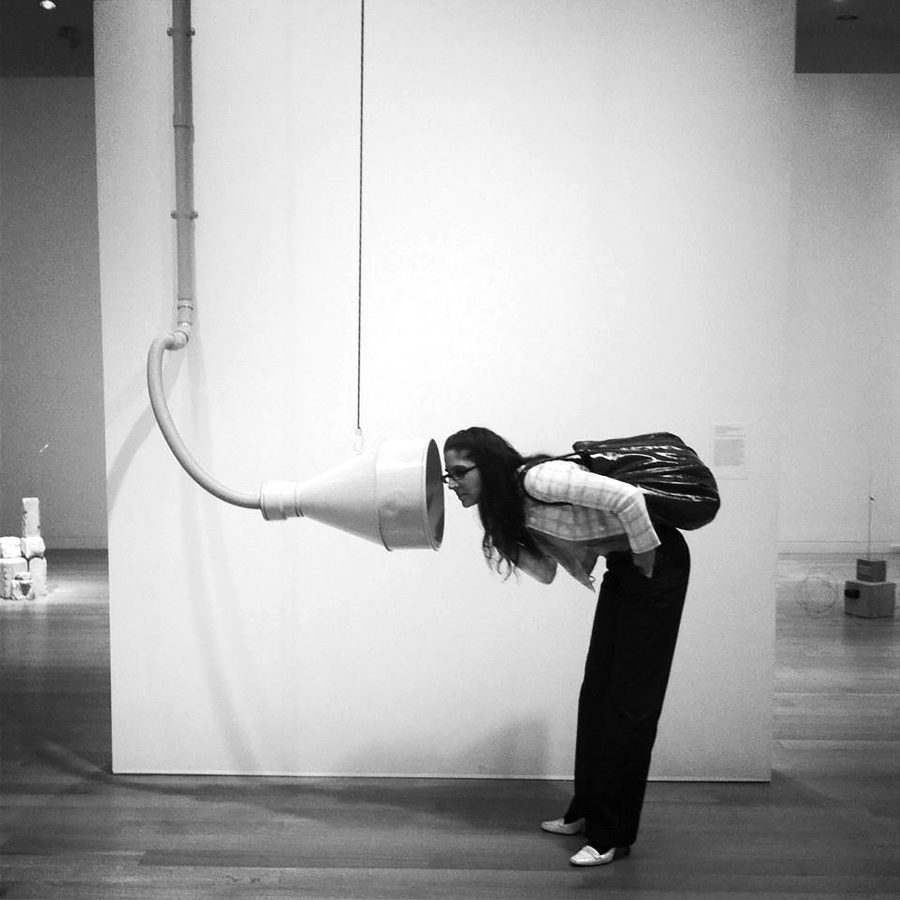Self-described policy nerd, Kathleen Bitetti makes art and policy from a compact office on a back road near Harvard Square. As a student at the University of Massachusetts Boston she ran the Harbor Art Gallery in the early 1990s, and curated innovative art exhibits that brought attention to the HIV/AIDS crisis at its peak. To her, art is about politics.
“We did the first show ever of people living with HIV/AIDS in Massachusetts,” she says. “It was intense because people couldn’t put their name on it, because there was nothing protecting folks from losing their housing, so it was a very intense show.”
As a part of ACT UP, working with the AIDS Action Committee, Bitetti wanted to honor people who were still alive.
“People were dying. It was the plague. It was really scary times. There were no protections. If somebody thought that you were HIV positive you could lose you job and your housing. There was nothing to protect folks.”
Taking a slew of art classes on campus, Bitetti studied with the late Jerry Burndt, an AP, Magnum and UPI photographer whose work changed how homelessness was dealt with in Boston. She curated shows in the gallery that would get people thinking about how to fix inequality and injustice.
“We did a whole show around censorship, a couple of shows around censorship ’cause that was what was going on at that time with Jesse Helms, and so it was a really intense time period. A lot of colleges were under siege. Funding for the arts and humanities was being cut back, and that was when we lost the fellowships for artists. Karen Finley. The NEA Four. It was a very intense time. That’s the backdrop I remember.”
She ran the gallery for about five years.
“We did some solo shows of important artists like Allan Rohan Crite, the late Allan Rohan Crite, who’s an incredible African-American artist, one of the most important that ever lived.”
Most of her professors incorporated social justice into their lessons.
“At UMass, when they did policy it wasn’t abstract; the professors were actually implementing the policy and working with the populations they were doing it for. Other places could be more abstract and not really actually talking to people they were doing policy for, which is why there is a lot of problems with policy because policy makers have no clue on who they’re making policy for or interacting with those populations. UMass McCormack School, and the economics department particularly, those folks were very involved.”
“You learn just as much from the folks in your class as you do the professors,” she says. “I don’t think any school where everyone was the same age would have worked for me. This was a place where no one asked if your friends were teen mothers, why you were dressed the way you were. To me the other schools were high school all over again, and I didn’t like high school really. I didn’t want to pay to go to high school again. This was a school that really was about learning.”
After graduating from UMass Boston, she created and curated exhibits all over Boston and became a facet of the Massachusetts art scene. Most recently, in the spring of 2014, her study for a new installation appeared in the Distillery Gallery in Boston. In addition to her work as an artist, Bitetti helps shape legislation in the interests of artists in Massachusetts.
“Most artists don’t get paid for their work no matter what line they’re in,” Bitetti said. “It’s what you would call in economics, a dual labor market structure.”
Museums, theaters, and increasingly companies like Google, lobby legislators on arts issues, both for funding and copyright issues. Often the interests of artists, acting as independent contractors, get overlooked.
“I work with people that make things from nothing,” Bitetti said. “It’s beyond arts funding for us.”
Bitetti co-founded Massachusetts Artists Leaders Coalition (MALC), with the mission “to ensure that artists are at the policy making table,” and Artists Under the Dome (artistsunderthedome.org), a website that tracks legislation that effects artists in Massachusetts. Her work influenced how the Affordable Care Act treats artists.
“A lot of it has to do with unintended consequences because people don’t understand stuff,” Bitetti said. “For the healthcare law, it’s hard for us to figure out our income.”
Outside of her office on a large brick terrace surrounded by young trees, their green crowns turning gold, Bitetti beams as she talks about UMass Boston. She’s a big fan of Chancellor Motley.
“He’s someone who really likes students,” she said. “It’s not a career step for him. He really cares about what’s there… He’s making UMass more and more a part of the dialogue in Boston, particularly with the new mayor.”
As a UMass Boston student, Bitetti learned the importance of fostering a positive community.
“Nothing is impossible,” she says. The most important things she learned were “how to build long-term connections and relationships in a sincere way, and that social justice issues are the most important thing you could ever work on and they should guide everything that you do.”
Psyched to see the upgrades on campus, Bitetti is looking forward to seeing where UMass Boston goes in the next 50 years.
“Chancellor Motley has done a wonderful job with building it out to be a first class university, to be on par with the folks who actually have more money, the Harvards and MITs, to physically have it be like that.”
Kathleen Bitetti Ensures Artists Have a Say in Public Policy
November 11, 2015
About the Contributor
Caleb Nelson served as the following positions for The Mass Media the following years:
Editor-in-Chief: Fall 2010; 2010-2011; Fall 2011
News Editor: Spring 2009; 2009-2010





















































